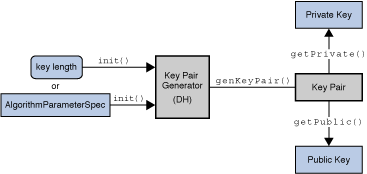Java Generate Public Key And Private Key
Now that you have generated a signature for some data, you need to save the signature bytes in one file and the public key bytes in another so you can send (via modem, floppy, mail, and so on) someone else
- Java Generate Public Key And Private Key West
- Java Keytool Generate Public Private Key Pair
- Public Key Definition
- How To Generate Public Key And Private Key In Java
- In case you travel and can’t carry your laptop with you, just keep your private key on a USB stick and attach it to your physical keychain. Your server will be much safer this way. Generate Public/Private SSH Key Pair. Open Command Prompt from the Start Menu and type.
- Jan 24, 2017 Public key cryptography uses a pair of keys for encryption. Distribute the public key to whoever needs it but safely secure the private key. Public key cryptography can be used in two modes: Encryption: Only the private key can decrypt the data encrypted with the public key.
- the data for which the signature was generated,
- the signature, and
- the public key
Nov 10, 2011 How to Generate A Public/Private SSH Key Linux By Damien – Posted on Nov 10, 2011 Nov 18, 2011 in Linux If you are using SSH frequently to connect to a remote host, one of the way to secure the connection is to use a public/private SSH key so no password is transmitted over the network and it can prevent against brute force attack.
The receiver can verify that the data came from you and was not modified in transit by running the VerSig program you will generate in the upcoming Verifying a Digital Signature steps. That program uses the public key to verify that the signature received is the true signature for the data received.
Recall that the signature was placed in a byte array named realSig. You can save the signature bytes in a file named sig via the following.
Recall from the Generate Public and Private Keys step that the public key was placed in a PublicKey object named pub. You can get the encoded key bytes by calling the getEncoded method and then store the encoded bytes in a file. You can name the file whatever you want. If, for example, your name is Susan, you might name it something like suepk (for 'Sue's public key'), as in the following:
To sign an assembly with a strong name, you must have a public/private key pair. This public and private cryptographic key pair is used during compilation to create a strong-named assembly. You can create a key pair using the Strong Name tool (Sn.exe). Key pair files usually have an .snk extension.

Note
In Visual Studio, the C# and Visual Basic project property pages include a Signing tab that enables you to select existing key files or to generate new key files without using Sn.exe. In Visual C++, you can specify the location of an existing key file in the Advanced property page in the Linker section of the Configuration Properties section of the Property Pages window. The use of the AssemblyKeyFileAttribute attribute to identify key file pairs was made obsolete beginning with Visual Studio 2005.
Create a key pair
To create a key pair, at a command prompt, type the following command:
sn –k <file name> Aes 256 key iv generator.
In this command, file name is the name of the output file containing the key pair.
The following example creates a key pair called sgKey.snk.
If you intend to delay sign an assembly and you control the whole key pair (which is unlikely outside test scenarios), you can use the following commands to generate a key pair and then extract the public key from it into a separate file. First, create the key pair:
Java Generate Public Key And Private Key West
Next, extract the public key from the key pair and copy it to a separate file:
Once you create the key pair, you must put the file where the strong name signing tools can find it.

Java Keytool Generate Public Private Key Pair
When signing an assembly with a strong name, the Assembly Linker (Al.exe) looks for the key file relative to the current directory and to the output directory. When using command-line compilers, you can simply copy the key to the current directory containing your code modules.
Public Key Definition
If you are using an earlier version of Visual Studio that does not have a Signing tab in the project properties, the recommended key file location is the project directory with the file attribute specified as follows: